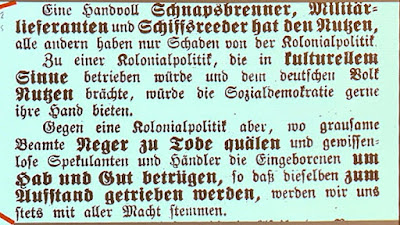 |
| The Imperial spiked helmet in a sandy color |

|
|
The glorious four in the order mentioned in the text show their
book. Red Baron is sitting in the second row, undoing his red scarf. What else? (©Rita Eggenstein/BZ) |
Freiburg seems to be the first major city where a reappraisal of Germany's colonial past was seriously undertaken. In the course of the evening, during the presentation of the four authors, I realized more and more that even today, an attitude of white supremacy is not only widespread in American minds.
When I worked at CERN (European Laboratory for High-Energy Physics), I lived in a house in a Geneva suburb. One of my neighbors was a professor of economics from British Guyana, holding a high position at the WHO (World Health Organization). He was married to a charming lady from Jamaica who was an English teacher at Geneva's International School. The couple had two daughters about the same age as my children, and as the four kids went to the same French college, we parents rapidly became close friends.
In those days, my mother took the then 12-hour train from Hamburg to Geneva to spend her summer holidays with us. She was raised in a strict Catholic faith on a Westphalian farm with seven brothers and one sister.
When our neighbors invited us to a grill party one evening, my mother became quite nervous, telling Elisabeth, "Ich kann doch einem Schwarzen keine Hand geben" (I cannot give my hand to a black person). Later she shook hands with Harvey and Jennifer when we entered their house and even enjoyed practicing her English* with our hosts.
*She had learned English only after the war with the BBC (British Broadcasting Corporation), "Lernt Englisch mit dem britischen Rundfunk."
While at CERN, I was frequently invited by the IAEA (International Atomic Energy Agency) in Vienna to serve as an expert in radiation protection. We sometimes had to draft education documents for developing countries in those working committees. I still remember the outcry of the chairman when one participant on the committee talked about underdeveloped countries.
Back to colonialism in Freiburg. The enthusiasms for Ostafrika (Tanzania), Deutsch-Südwest (Namibia), and Kamerun were already intense in all social classes before the Great War. Merchants made enormous profits on Kolonialwaren (colonial goods), the churches were collecting money focused on the conversion of Heidenkinder (pagan children), and even the working class - although condemning the exploitation and the poor treatment of the natives in Germany's colonies - wanted to keep those territories by all means.
A highlight in Freiburg was the 50th
anniversary of the Reichskolonialtagung (Imperial Colonial
Conference), combined with a colonial exhibition in 1935. Although the then
Nazi rulers celebrated the day as a national event, it had been Lord Mayor
Karl Bender of the Catholic Centrum Party who, in 1932, had already paved the way
for the event.
When in 2019, I see French troops keeping order in their former African possessions, should I rejoice, "Thank God that we Germans lost our colonies already in 1918?" Not really. Presently German troops are in Africa helping our friends from outre-Rhin.
When in 2019, I see French troops keeping order in their former African possessions, should I rejoice, "Thank God that we Germans lost our colonies already in 1918?" Not really. Presently German troops are in Africa helping our friends from outre-Rhin.
*


No comments:
Post a Comment